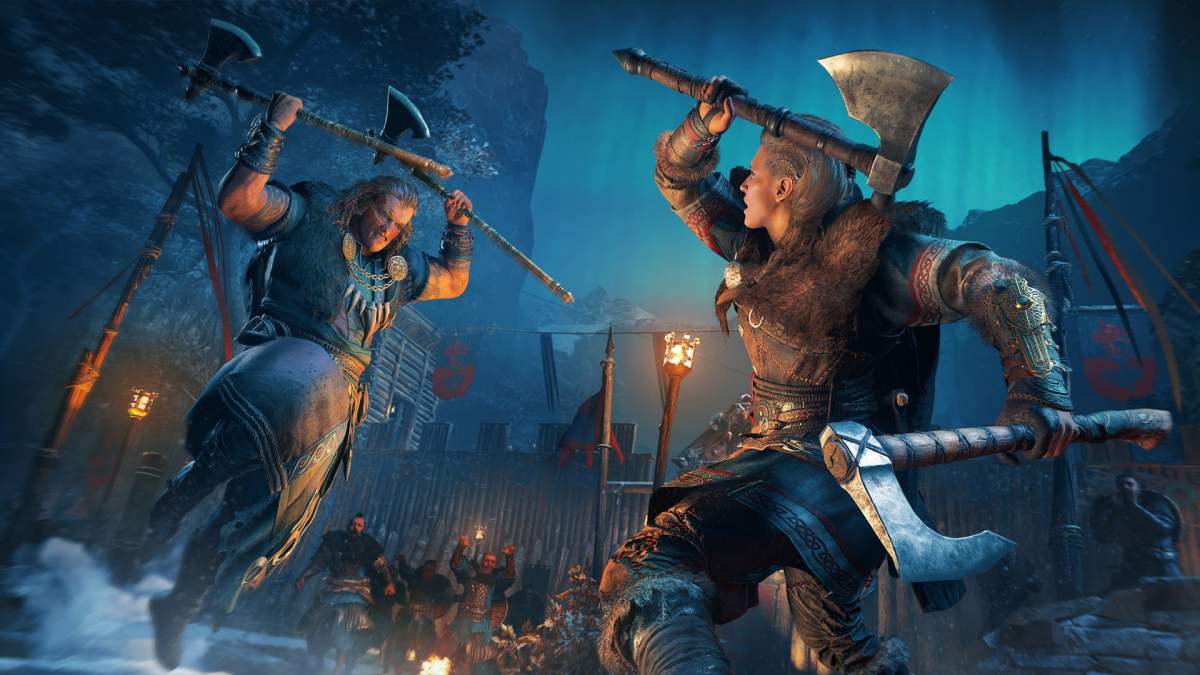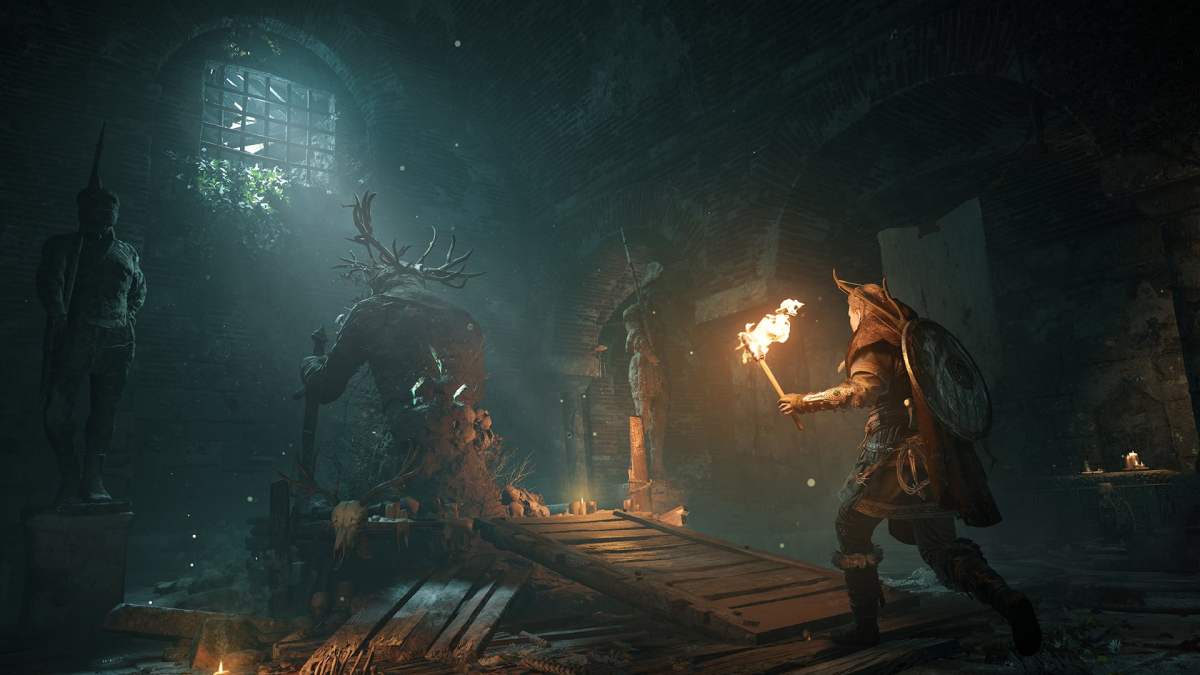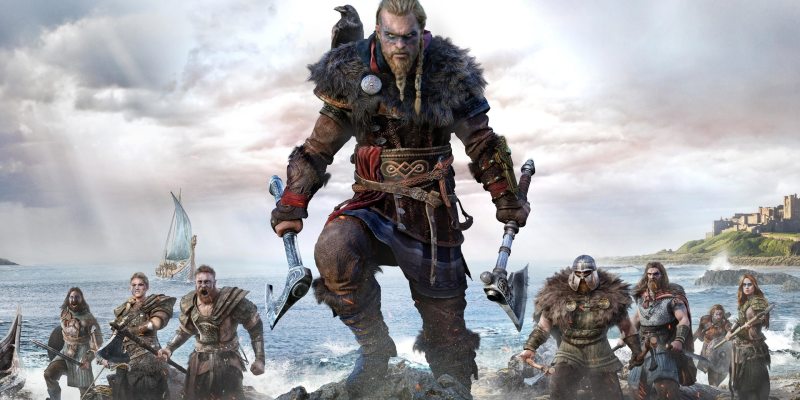When Assassin’s Creed moved away from its legacy open-world systems and adopted more RPG elements in 2017’s Origins, it felt like the start of something special, but only a half-step in its intended direction. 2018’s Odyssey moved much closer to that vision with many more successes than failures. Now, Assassin’s Creed Valhalla puts it all together and delivers the best RPG experience the Ubisoft series has seen yet, while telling a story that feels more freeform and full of life than all that came before it.
In 9th century Norway, the Raven Clan departs from home and arrives in England and quickly overtakes a village by force, as Vikings do. This new settlement, deemed Ravensthorpe, becomes your hub of all life in the new country. Building it up one building at a time gives you direct control in how you approach Valhalla, and you can largely construct them in any order you’d like.
There are over a dozen different ally tents, shops, and other areas to construct, and each one opens up new questlines and gameplay elements such as fishing, hunting early Templars (Order of the Ancients), or even holding feasts for your entire clan that will leave protagonist Eivor’s skills buffed for the toughest foes.
With the ally map, Eivor and another of her clan’s leaders can commit to forming new bonds across the land. You’re fish out of water in England, so to survive, you’ll need new allies, and each new region you find yourself in introduces new arcs that play out like seasons of a years-long TV series. You can choose your own direction here too for a good while, provided you adhere to some suggested level thresholds. Valhalla connects the disparate pieces much better than even Odyssey, which I’d felt is the best game in the series. Now, it’s hard to say.

There’s something to be said about the sheer size of Assassin’s Creed Valhalla. While the map of England appears substantially smaller than that of Greece or Egypt, it’s much fuller. New “World Event” side quests play out like Stranger missions in Red Dead Redemption 2, where you’ll routinely happen upon interesting new faces, sometimes several times over across their own mini-sagas, in stories that enrich the world around you and often tie directly into other activities you’ll want to do anyway.
In my travels, I fought alongside a band of nuns armed only with their fists and the will of their God, played make-believe with a group of kids only to discover they were imagining a world where my clan is brutalized, and stole a crate of clothes on standby from a nudist colony. These and other stories don’t play into the main quests, but they color the world and make it hard to leave a region without substantially clearing the map.
Assassin’s Creed Valhalla offers better RPG development mechanics than ever. A web-like skill tree allows players to incrementally improve Eivor’s power level into the 300+ marker. There are three basic trees, and the skills reveal themselves gradually as you progress down them. You’ll always have a few skills within reach, and along the way you’ll make Eivor stronger, faster, or sturdier across disciplines of ranged, melee, and stealth combat. Leveling up occurs often and doles out a pair of skill points each time, allowing players to chart their own paths.

There are fewer adrenaline-draining abilities in Assassin’s Creed Valhalla than in Odyssey, which is for the best. Another change for the better is that you don’t unlock ability points; you find the abilities in the world by reading Books of Knowledge often tucked away in crypts and other environmental puzzles.
Each ability can be found in two places, so when you find it again, you upgrade that ability. There are still plenty to choose from, but I love this approach because it doesn’t feel like you’re leaving so much behind. Builds can be customized down to the minutia without the game feeling like it’s thrown more at you than you could ever utilize.
These abilities are a part of an improved combat system that doesn’t rewrite everything from the last few games, but instead adds satisfying wrinkles. Best of all is a new way to use ranged combat where enemy weak points are highlighted, and hitting them can cripple opponents and leave them vulnerable to devastating finishing blows. Gone are the spears, swords, and tridents, and in their place come axes, hammers, and, my favorite, flails. Each brings its own custom finisher that reminds you that Eivor, while malleable during various story beats, is unwaveringly fierce.
Overall, the combat feels grittier than before, and it matches the world’s overcast skies and sometimes driving rain. When the sun peeks through, England has some beautiful sights to behold, but the people inhabiting it are often brutish and unforgiving. It’s an interesting backdrop in which to insert players and allow them to rise above these base instincts — or, just as validly, not.

Despite all this player agency, Assassin’s Creed Valhalla will still bottleneck you when it wants to. There is an extended arc that feels out of place and dragged out, and it soured a lot of my early experience. It rips Eivor away from her clan, away from the story that was, until then, moving along so impressively, in favor of something that feels secondary to what really matters.
On the other hand, the modern-day sections, which have largely felt stuck in place for the last several games, feel more important in Valhalla than in recent entries. It’s always a bit jarring to exit the Animus and play again as Layla, but I didn’t dread it this time because the story finally finds its rudder again.
Regardless, if an 80+-hour game releases as polished, exciting, and engrossing as Assassin’s Creed Valhalla, a few pacing problems are acceptable. A lot of Eivor’s life feels new to the series too, making this game one of the easiest recommendations of the year. Viking Raids are fun new combat missions that reward you with major rewards that directly affect your settlement and reveal new activities.
Eivor’s story is both personal and pivotal to the modern-day saga, giving way to yet another standout hero for the series to celebrate. It’s a game of many hits and very few misses, a body of work that exemplifies the series’s evolution.
Since nearly all the various trinkets and relics and map markers have meaningful purpose, Assassin’s Creed Valhalla is a rare open-world game where virtually every activity feels worth doing. Like Eivor scaling the snow-covered mountains of Norway, Valhalla achieves new heights for the RPG era of Assassin’s Creed, and I’ve never been more excited to see where the series goes next.
